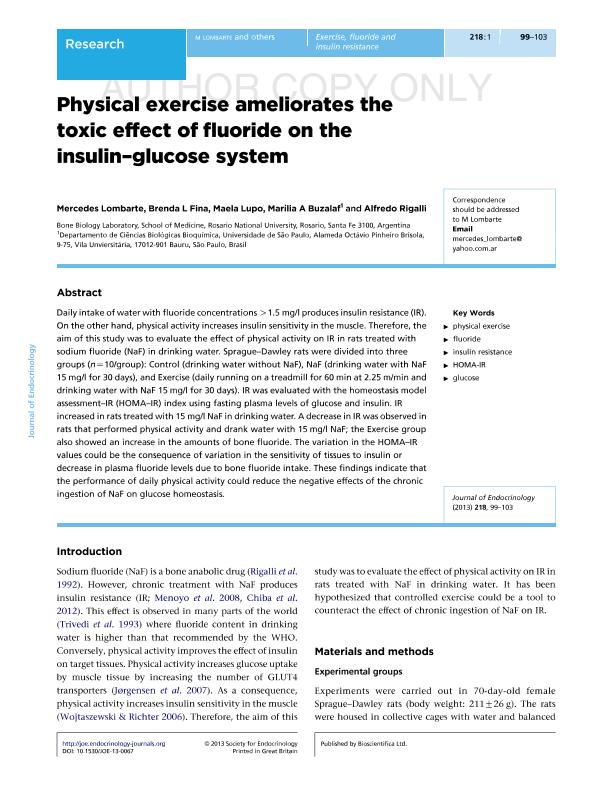Mostrar el registro sencillo del ítem
dc.contributor.author
Lombarte, Mercedes

dc.contributor.author
Fina, Brenda Lorena

dc.contributor.author
Lupo, Maela

dc.contributor.author
Buzalaf, Marilia A.
dc.contributor.author
Rigalli, Alfredo

dc.date.available
2017-08-02T15:13:58Z
dc.date.issued
2013-05
dc.identifier.citation
Lombarte, Mercedes; Fina, Brenda Lorena; Lupo, Maela; Buzalaf, Marilia A.; Rigalli, Alfredo; Physical exercise ameliorates the toxic effect of fluoride on the insulin–glucose system; BioScientifica; Journal of Endocrinology; 218; 1; 5-2013; 99-103
dc.identifier.issn
0022-0795
dc.identifier.uri
http://hdl.handle.net/11336/21750
dc.description.abstract
Daily intake of water with fluoride concentrations >1.5 mg/l produces insulin resistance (IR). On the other hand, physical activity increases insulin sensitivity in the muscle. Therefore, the aim of this study was to evaluate the effect of physical activity on IR in rats treated with sodium fluoride (NaF) in drinking water. Sprague–Dawley rats were divided into three groups (n=10/group): Control (drinking water without NaF), NaF (drinking water with NaF 15 mg/l for 30 days), and Exercise (daily running on a treadmill for 60 min at 2.25 m/min and drinking water with NaF 15 mg/l for 30 days). IR was evaluated with the homeostasis model assessment–IR (HOMA–IR) index using fasting plasma levels of glucose and insulin. IR increased in rats treated with 15 mg/l NaF in drinking water. A decrease in IR was observed in rats that performed physical activity and drank water with 15 mg/l NaF; the Exercise group also showed an increase in the amounts of bone fluoride. The variation in the HOMA–IR values could be the consequence of variation in the sensitivity of tissues to insulin or decrease in plasma fluoride levels due to bone fluoride intake. These findings indicate that the performance of daily physical activity could reduce the negative effects of the chronic ingestion of NaF on glucose homeostasis.
dc.format
application/pdf
dc.language.iso
eng
dc.publisher
BioScientifica

dc.rights
info:eu-repo/semantics/openAccess
dc.rights.uri
https://creativecommons.org/licenses/by-nc-sa/2.5/ar/
dc.subject
Physical Exercise
dc.subject
Fluoride
dc.subject
Insulin Resistance
dc.subject
Homa-Ir
dc.subject
Glucose
dc.subject.classification
Bioquímica y Biología Molecular

dc.subject.classification
Medicina Básica

dc.subject.classification
CIENCIAS MÉDICAS Y DE LA SALUD

dc.title
Physical exercise ameliorates the toxic effect of fluoride on the insulin–glucose system
dc.type
info:eu-repo/semantics/article
dc.type
info:ar-repo/semantics/artículo
dc.type
info:eu-repo/semantics/publishedVersion
dc.date.updated
2017-07-28T18:01:49Z
dc.identifier.eissn
1479-6805
dc.journal.volume
218
dc.journal.number
1
dc.journal.pagination
99-103
dc.journal.pais
Reino Unido

dc.journal.ciudad
Bristol
dc.description.fil
Fil: Lombarte, Mercedes. Universidad Nacional de Rosario. Facultad de Ciencias Médicas. Laboratorio de Biología Ósea; Argentina. Consejo Nacional de Investigaciones Científicas y Técnicas; Argentina
dc.description.fil
Fil: Fina, Brenda Lorena. Universidad Nacional de Rosario. Facultad de Ciencias Médicas. Laboratorio de Biología Ósea; Argentina. Consejo Nacional de Investigaciones Científicas y Técnicas; Argentina
dc.description.fil
Fil: Lupo, Maela. Universidad Nacional de Rosario. Facultad de Ciencias Médicas. Laboratorio de Biología Ósea; Argentina. Consejo Nacional de Investigaciones Científicas y Técnicas; Argentina
dc.description.fil
Fil: Buzalaf, Marilia A.. Universidade de Sao Paulo; Brasil
dc.description.fil
Fil: Rigalli, Alfredo. Universidad Nacional de Rosario. Facultad de Ciencias Médicas. Laboratorio de Biología Ósea; Argentina. Consejo Nacional de Investigaciones Científicas y Técnicas; Argentina
dc.journal.title
Journal of Endocrinology

dc.relation.alternativeid
info:eu-repo/semantics/altIdentifier/doi/http://dx.doi.org/10.1530/JOE-13-0067
dc.relation.alternativeid
info:eu-repo/semantics/altIdentifier/url/http://joe.endocrinology-journals.org/content/218/1/99
Archivos asociados
